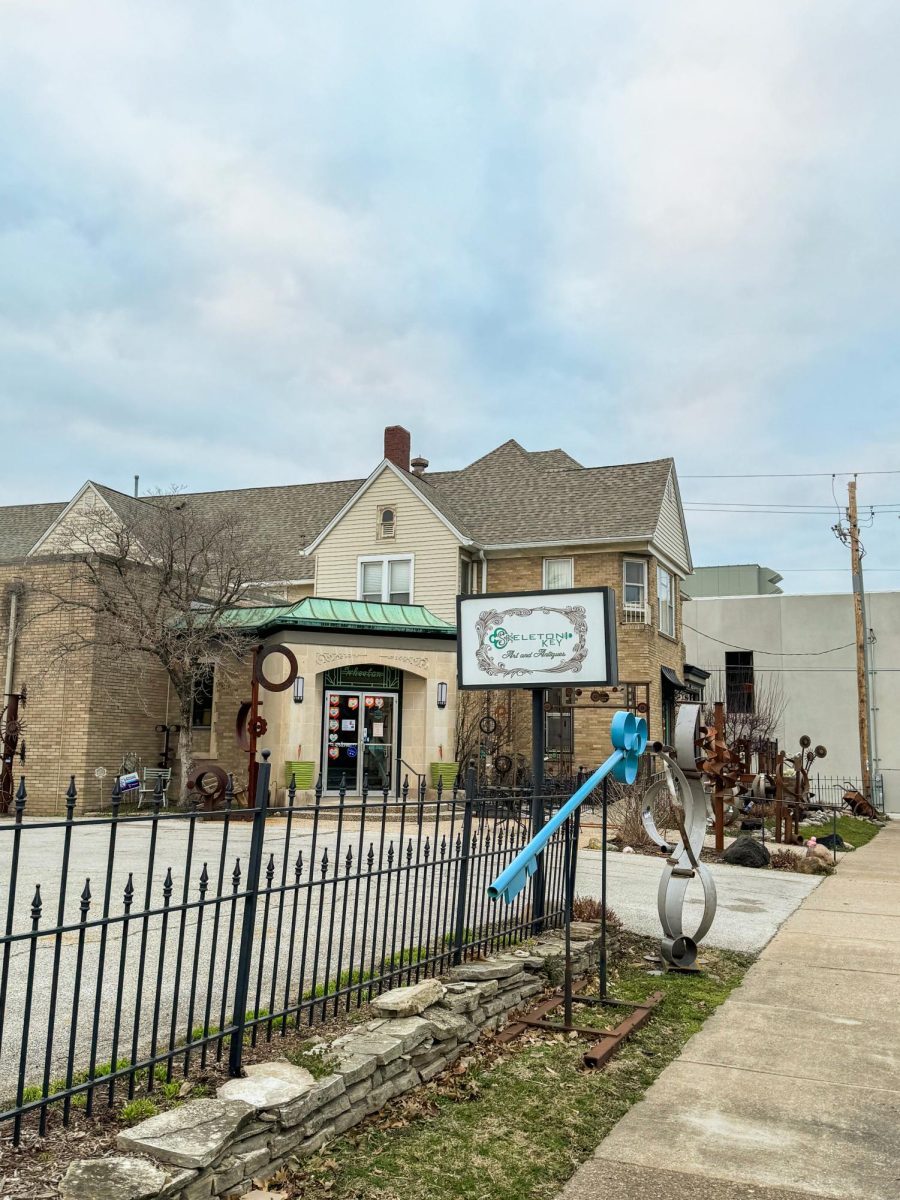Books, poetry, arts and crafts, handmade gifts, community events, volunteer work: The Artsy Bookworm positioned itself as a jack-of-all-trades and a gem of an independent bookstore right by campus. For students and locals alike it represented acceptance, promoting banned books and topics that online advertisers commonly shy away from.
Because of its unique position as a haven for much-needed resources, it came as a shock when the store announced it would be reorganizing its operations. The Artsy Bookworm officially closed its 30th St. location on Jan. 20, 2024. To those who frequented the business, which was Rock Island’s only independent bookseller, it was hard to know how to react.
The Artsy Bookworm first planted its seeds in Rock Island in 2021, popping up right next to Augustana’s campus as an accessible space full of handmade gifts, art and books by and for underserved populations. It quickly grew roots which spread through community collaboration, and its location within walking distance from Augustana’s student housing made the store a place for students to connect with each other and explore topics from LGBTQ+ joy and racial justice to indigenous advocacy and neurodiversity.
Quelling fears that the community would lose the valuable resources on offer, the store’s founder, Tamara Felden, said that The Artsy Bookworm will continue to pursue its vision through an integration with Skeleton Key Arts and Antiques and through diversification.
“We figured if we can spread ourselves through the community, we could reach a larger audience than would otherwise be the case,” Felden said. “If you’re a community organizer, the number one rule is you have to go where the people are, so I decided to close the bookstore in favor of doing things in the community that are now becoming possible.”
By closing the physical location, which had seen declining revenues since 2022, costs could be lowered and new audiences reached. In other words, The Artsy Bookworm made the decision to reorganize in an effort for growth. A new location and partnership with a popular local business brings in new customers, but it also attracts the attention of even more dedicated staff than already work with the business. Felden said that it can be difficult for any organization to find the people they need.
“You have to find people who really believe the same kinds of things that you believe. You have to find the ones who have time to give, because my joke is that it’s the same 17 people who belong to everything,” Felden said.
Rallying around a shared cause, like the promotion of underrepresented populations in literature, has been at the core of The Artsy Bookworm’s operations since its beginning.
The connective power of independent bookstores is unique to their form. Their sales are driven not by algorithms but by feedback from the specific populations they sell to.
Garrett Traylor, a research librarian at Augustana, said that this allows the stores to become a place for exploration in a way that bigger businesses can’t match.
“If you search for books on Google, a lot of those algorithms are set up to push advertised content, so you don’t have quite the same discovery,” Traylor said.
In contrast, selling books independently puts the decision making in the hands of humans who can read and assess texts for their local value. In other words, local sales provide less-recognized demographics access to books written by people like themselves.
Junior Lainey Terfruchte, editor-in-chief for SAGA, Augustana’s literary magazine, said that SAGA’s process of curating written work is a human process.
“We’re really big on discussion and when we’re choosing what to include we try to make sure that each piece gets its time,” Terfruchte said. “Even if people are initially not sure about it, we want to make sure that we’re really looking at what every piece has to offer.”
The intentionality of independent publishing and sales makes local bookstores ripe for exploration.
Beyond the physical difference between perusing a local bookstore and scrolling through Amazon listings, there is a difference in capabilities between the two sales models.
Big-name booksellers may be able to provide specific books very quickly and cheaply, but
purchasers are not able to ask for recommendations, learn about community events or purchase handmade gifts and art. They do not have the opportunity to speak with other readers about a book they are halfway done with or share their thoughts on a specific local author.
Though the concept of local bookselling may have broad support, the immediate benefits to those buying books through impersonal online sellers are very real—especially to students. As a demographic, college students are deeply motivated by cost and time-savings. Felden said that Amazon’s ultra-competitive prices are a way for them to target independent businesses.
“Amazon very actively works to do away with independent bookstores. They will sell new releases of books for less than I can buy them, and that is true of independent bookstores in general,” Felden said.
Despite the indisputable power held by corporations like Amazon, everybody can play a part in supporting small businesses.
The Artsy Bookworm’s transition is intended to help lower operational costs and diversify their business, allowing them to make the most of their limited means. Those looking to purchase books can make small changes to help fund the community involvement that The Artsy Bookworm has become known for.
By utilizing the currently in-progress e-commerce portion of the store, customers will be able to benefit from the same thoughtful organization and varied voices which characterized the physical storefront. Updates will be posted to The Artsy Bookworm Facebook page, but in the meantime websites like Bookshop.org allow customers to select independent stores near them to receive the full profit of online orders placed through the site.
Senior Bethany Abrams, who produced a documentary about The Artsy Bookworm for a J-term course, said that actively interacting with local bookstores benefits everybody involved.
“Networking and building connections is important for small businesses compared to those big corporations,” Abrams said. “Being able to reach out to the community tells people, ‘come see us; we also see you.’”
Set to graduate in the spring with degrees in psychology, creative writing and English, Abrams said that she resonates with the idea of worrying about establishing oneself in a field dominated by giants.
“Something that I’ve been thinking of, especially now that I’ll be graduating, is getting my foot in the door in the film industry as someone who doesn’t have those connections set in place,” Abrams said.

There is power in standing firmly by your values and aspirations, and this is true both for students and business owners alike.
For The Artsy Bookworm, social justice and the improvement of local communities continue to be driving forces.
Though the recent closure was in part motivated by declining revenues and a shortage of available staff, Felden and her team are using the location change as an opportunity to draw more people towards local art and diverse literature.
Felden said that the success of any small business relies on the group effort of customers and staff with shared goals and interests.
“Even though I’m the owner, anybody who says they succeeded alone is lying,” Felden said. “People in the community gave their input and a lot of longtime friends got connected to the store.”
Those connections live on through The Artsy Bookworm Book Club and The Artsy Stitchers who meet at local venues and bring people together through reading and fiber art.
The business’ team of community members and friends continue to actively work with over 40 local authors at their new location.
Felden said that The Artsy Bookworm is considering seeking a 501(c)(3) status, which would establish them as a nonprofit organization.
Students who will miss the accessibility of The Artsy Bookworm’s previous location can turn not only to the seeds which the business planted, but can reach out to Tredway Library.
Despite the differences in form, Traylor said that students are always welcome to attend special events and suggest texts, art and more for the library to make available to the college.
“I’m always open to ideas. Making sure students know they can come to us is a big thing,” Traylor said.
Though The Artsy Bookworm’s 30th St. storefront now exists in the memories of the Augustana students and community members it served, Felden’s goal of bringing people together is alive and well.
Although fans of the physical store will have to wait patiently through its transition period, they have much to look forward to.
Bethany Abrams formerly worked for the Observer.














































































































